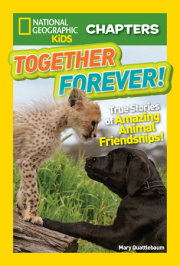Junkyard Jungle Ten-year-old Nitro paced in his cage. It was the evening of February 21, 2009. The sun was setting quickly. Nitro’s owner, Jeffrey Harsh, was late with the tiger’s dinner.
Hungry big cats get restless, but Nitro couldn’t pace far. His chain-link cage was only 20 feet wide and 30 feet long—one-third the size of a school gym. Nitro was eight feet long. He could only take a few steps. Then he had to turn and walk the other way. Back and forth. Back and forth.
He stepped over bones in the dust. They were left over from earlier meals. He brushed against Apache, the other tiger in his cage. His empty belly grumbled. He growled and roared.
Nitro and Apache were not alone. There were three female lions in other cages nearby. All of these big cats were living at the Prairie Cat Animal Refuge near Oakley, Kansas—and they were all hungry.
A man wandered to the main gate. The cats’ eyes locked on him. He opened the gate and slowly came inside.
The man passed piles of junk.
He looked into each animal’s cage. Nitro listened, while the other cats studied the stranger.
Then the man walked toward a lioness. He slipped his hand inside the metal bars of her gate.
It was a very bad choice.
To the hungry lion, his arm looked like dinner. Her instinct told her to catch her meal, and she listened. She bit down on the stranger’s arm. He screamed and screamed.
Just then Jeffrey drove up with a truck full of meat. He could tell right away things were not right. The entry gate was unlocked and open. Screams were coming from the big cats’ cages. Jeffrey jumped out of his truck and ran toward the sound.
Jeffrey saw the stranger. He ran past Nitro, toward the lion cage. Jeffrey grabbed the man and tried to pull him free. But he wasn’t as strong as the lion, and she would not let go. He never hit the animals, but he didn’t know what else to do. The man was in serious danger.
Jeffrey picked up a metal pipe and swung at the lioness. At last, she opened her jaws, and the frightened man fell back. Jeffrey rushed the stranger to the hospital. As he drove, he called the police on his cell phone.
Nitro would have to wait a little longer for his dinner. His owner was under arrest. He had not protected the stranger from the dangerous big cats.
Until that night, Jeffrey Harsh had broken no laws. Almost half of the states in the U.S. have passed laws to make it illegal to own wild animals like Nitro. Thirteen other states have some rules that say who can keep them and who cannot. The rest of the states have almost no laws at all. There, almost anyone can buy a wild animal.
Kansas is one of the 13 states with some rules. But the rules are not strong enough, said Sheriff Rod Taylor, the officer who arrested Jeffrey. Owners do not even need to take a class to learn how to care for a wild animal. If people like Jeffrey Harsh follow a few rules, they can buy big cats and raise them. And terrible things can happen.
Jeffrey didn’t see it that way. He didn’t think his big cats would hurt anyone. He thought since his animals were raised in captivity, or in cages, they would not act like wild animals.
“They were born in captivity,” he said on his website, “and bottle fed, so they think they are human. They are as gentle and sweet as a house cat.” He was wrong.
The judge gave Jeffrey a choice. He could pay fines and spend months in jail, or he could give the big cats to people who knew how to take care of them. Jeffrey decided to give his pets away. The lionesses were headed to the Detroit Zoo. But this zoo didn’t need any tigers. No zoo did.
So where would Nitro and Apache go? Sheriff Taylor called animal rescue experts for help. They told him about Carolina Tiger Rescue in North Carolina. Would they agree to take Nitro and Apache? That was the big question.
Kathryn Bertok works at Carolina Tiger Rescue. She takes care of the animals that live there.
“We won’t take an animal unless we can take them for the rest of their lives,” Kathryn explained. That’s because moving a tiger is hard. It is hard for the tiger. It is also hard for the people moving it.
Tigers that are cared for by humans can live to be 20 years old. Nitro and Apache were 10 years old. Tiger Rescue would have to pay the cost of feeding and caring for two tigers for ten more years. Could they afford it?
There was another important question: How much space would Nitro and Apache need? Big cats get sad in small spaces. They pace in a figure-eight pattern. They pant and grumble. They even suck their tails, like a baby human sucks its thumb.
The tiny cage in Kansas was far too small for two full-grown cats. A new home for Nitro and Apache would need to be bigger. Much bigger. It would take a space 37 times as big as their Kansas cage to keep them happy.
Experts at Carolina Tiger Rescue thought long and hard.
At last, they answered yes.
Copyright © 2012 by Kelly Milner Halls. All rights reserved. No part of this excerpt may be reproduced or reprinted without permission in writing from the publisher.


































